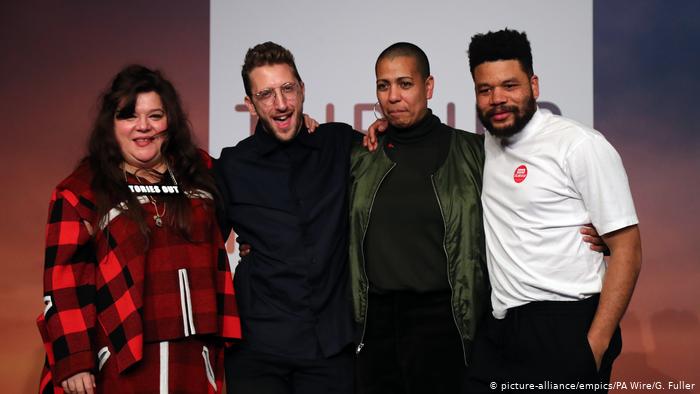
The UK's prestigious Turner Prize for art was awarded to all four shortlisted artists on Tuesday.
The four finalists — Lawrence Abu Hamdan, Helen Cammock, Oscar Murillo and Tai Shani — jointly won the 2019 Turner Prize after they asked the jury to consider them as a collective, prize organizers said Tuesday during the ceremony at the Turner Contemporary gallery in Margate, southeast England.
The artists said that in a divided world, they wanted the prize "to make a collective statement in the name of commonality, multiplicity and solidarity in art as in society."
Jury president Alex Farquharson of the Tate Britain gallery in London said the panel of judges agreed unanimously to the request.
The four artists had not met before they were shortlisted for the prize earlier this year, but had "formed a real creative and ethical bond," said Farquharson.
"It's not four winners. It's one winner, and it's the four of them as a collective," he continued.
The work of all four artists deals with the political. Beirut-based Hamdan interviewed former inmates of a notorious Syrian prison for a sound installation; Cammock's work explores the civil rights movement in Northern Ireland; Murillo is influenced by the history of his native Colombia; and Shani originated a feminist science fiction world for her nominated work.
The winner of the Turner Prize usually receives £25,000 (€29,300, $32,000) and the runners-up £5000 (€5,800, $6,400) each. This year, the winners can divide the £40,000 prize as they wish.
The Turner Prize was founded in the UK in 1984 and is named for the 19th-century landscape painter J.M.W. Turner.
Previous winners include Damien Hirst and "12 Years a Slave" director Steve McQueen. The award has faced criticism for honoring impenetrable conceptual art works and often sparks discussions surrounding modern art's value.
The Turner Prize had "broken the mold" before, Farquharson said, with recent winners and nominees including architects and human rights researchers. Innovating had "kept the Turner Prize dynamic and surprising and not ossified."
"I don't think it would have had that long history had it not evolved, had it not surprised us," he said.